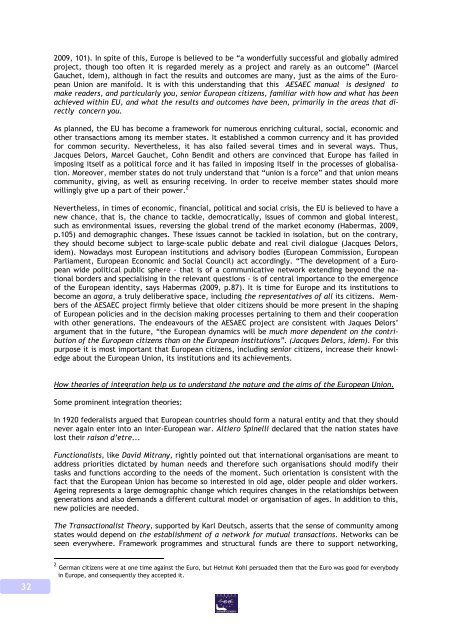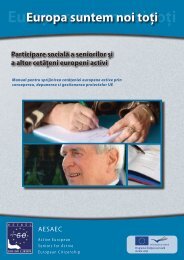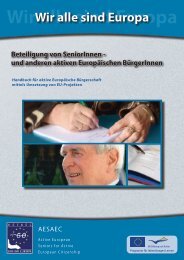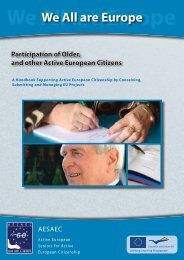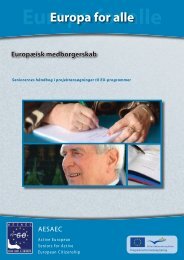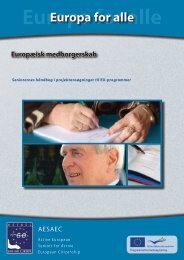We All are Europe - AESAEC
We All are Europe - AESAEC
We All are Europe - AESAEC
You also want an ePaper? Increase the reach of your titles
YUMPU automatically turns print PDFs into web optimized ePapers that Google loves.
2009, 101). In spite of this, <strong>Europe</strong> is believed to be “a wonderfully successful and globally admired<br />
project, though too often it is regarded merely as a project and r<strong>are</strong>ly as an outcome” (Marcel<br />
Gauchet, idem), although in fact the results and outcomes <strong>are</strong> many, just as the aims of the <strong>Europe</strong>an<br />
Union <strong>are</strong> manifold. It is with this understanding that this <strong>AESAEC</strong> manual is designed to<br />
make readers, and particularly you, senior <strong>Europe</strong>an citizens, familiar with how and what has been<br />
achieved within EU, and what the results and outcomes have been, primarily in the <strong>are</strong>as that directly<br />
concern you.<br />
As planned, the EU has become a framework for numerous enriching cultural, social, economic and<br />
other transactions among its member states. It established a common currency and it has provided<br />
for common security. Nevertheless, it has also failed several times and in several ways. Thus,<br />
Jacques Delors, Marcel Gauchet, Cohn Bendit and others <strong>are</strong> convinced that <strong>Europe</strong> has failed in<br />
imposing itself as a political force and it has failed in imposing itself in the processes of globalisation.<br />
Moreover, member states do not truly understand that “union is a force” and that union means<br />
community, giving, as well as ensuring receiving. In order to receive member states should more<br />
willingly give up a part of their power. 2<br />
Nevertheless, in times of economic, financial, political and social crisis, the EU is believed to have a<br />
new chance, that is, the chance to tackle, democratically, issues of common and global interest,<br />
such as environmental issues, reversing the global trend of the market economy (Habermas, 2009,<br />
p.105) and demographic changes. These issues cannot be tackled in isolation, but on the contrary,<br />
they should become subject to large-scale public debate and real civil dialogue (Jacques Delors,<br />
idem). Nowadays most <strong>Europe</strong>an institutions and advisory bodies (<strong>Europe</strong>an Commission, <strong>Europe</strong>an<br />
Parliament, <strong>Europe</strong>an Economic and Social Council) act accordingly. “The development of a <strong>Europe</strong>an<br />
wide political public sphere - that is of a communicative network extending beyond the national<br />
borders and specialising in the relevant questions - is of central importance to the emergence<br />
of the <strong>Europe</strong>an identity, says Habermas (2009, p.87). It is time for <strong>Europe</strong> and its institutions to<br />
become an agora, a truly deliberative space, including the representatives of all its citizens. Members<br />
of the <strong>AESAEC</strong> project firmly believe that older citizens should be more present in the shaping<br />
of <strong>Europe</strong>an policies and in the decision making processes pertaining to them and their cooperation<br />
with other generations. The endeavours of the <strong>AESAEC</strong> project <strong>are</strong> consistent with Jaques Delors’<br />
argument that in the future, “the <strong>Europe</strong>an dynamics will be much more dependent on the contribution<br />
of the <strong>Europe</strong>an citizens than on the <strong>Europe</strong>an institutions”. (Jacques Delors, idem). For this<br />
purpose it is most important that <strong>Europe</strong>an citizens, including senior citizens, increase their knowledge<br />
about the <strong>Europe</strong>an Union, its institutions and its achievements.<br />
How theories of integration help us to understand the nature and the aims of the <strong>Europe</strong>an Union.<br />
Some prominent integration theories:<br />
In 1920 federalists argued that <strong>Europe</strong>an countries should form a natural entity and that they should<br />
never again enter into an inter-<strong>Europe</strong>an war. Altiero Spinelli decl<strong>are</strong>d that the nation states have<br />
lost their raison d’etre...<br />
Functionalists, like David Mitrany, rightly pointed out that international organisations <strong>are</strong> meant to<br />
address priorities dictated by human needs and therefore such organisations should modify their<br />
tasks and functions according to the needs of the moment. Such orientation is consistent with the<br />
fact that the <strong>Europe</strong>an Union has become so interested in old age, older people and older workers.<br />
Ageing represents a large demographic change which requires changes in the relationships between<br />
generations and also demands a different cultural model or organisation of ages. In addition to this,<br />
new policies <strong>are</strong> needed.<br />
The Transactionalist Theory, supported by Karl Deutsch, asserts that the sense of community among<br />
states would depend on the establishment of a network for mutual transactions. Networks can be<br />
seen everywhere. Framework programmes and structural funds <strong>are</strong> there to support networking,<br />
32<br />
2 German citizens were at one time against the Euro, but Helmut Kohl persuaded them that the Euro was good for everybody<br />
in <strong>Europe</strong>, and consequently they accepted it.


